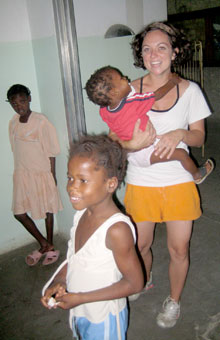Combating Malnutrition in Haiti
Erin Papworth listened attentively throughout a lecture by Ian Rawson, chair of Haiti's Albert Schweitzer Hospital, planning her future between his words. As Rawson spoke about the hospital's nutrition programs to the group gathered at the Tulane School of Public Health and Tropical Medicine, Papworth thought to herself, “I could do this.”

Tulane student Erin Papworth, shown here at the Albert Schweitzer Hospital in Haiti, spent five weeks assisting the hospital in its efforts to provide nutrition for the region's growing number of malnourished children. (Photo provided by the Albert Schweitzer Hospital, Haiti)
During his lecture last March, Rawson expressed an interest in creating an internship that would link the university's top-notch students to the Haitian hospital. Papworth immediately expressed interest in participating.
“It was a perfect match,” said Papworth, who will complete her master of public health with a concentration in international health next May. “I have previous international aid experience working in nutrition, and I've always wanted to work in Haiti.”
Penny Jessop, clinical assistant professor in the School of Public Health and Tropical Medicine, says that she encouraged Papworth to make the trek because of Papworth's ability to speak French and her previous international experience working in Darfur with the Doctors Without Borders program.
“Haiti is a very different country that takes a special kind of person who can handle being put in the middle of it all,” Jessop said. “In this situation, Erin was an ideal candidate, but we encourage all of our international health students to get international experience because it isn't just enough to have what's learned in the classroom.”
This summer, Papworth spent five weeks living and working in Deschapelle, Haiti, immersed in Haitian culture. During her stay, she assisted in implementing a nutrition plan that aids the hospital in treating mildly to severely malnourished children.
“I really enjoyed Haiti because it was quite similar to other countries where I've worked in Africa. However, given the location and history, Haiti has a unique and complex context of its own,” Papworth said. “The hardest part was learning how to balance the fact that I was there only temporarily, acting more like a consultant than a long-term employee.”
Alongside groups of workers from nongovernmental organizations tending to nearby villages and one other student intern from the Harvard School of Public Health, Papworth says her tasks included reviewing project-planning documents, performing field observation of a community-based program teaching health practices to mothers, and overseeing the delivery of supplies from the hospital's nutrition program into rural areas.
Although the internship was short-lived, Papworth says she believes that she touched lives and accomplished the assigned objectives. Not only did she return from Haiti with a lengthened resume, she is proud to have played a small role in helping to end the world's ongoing food crisis.
